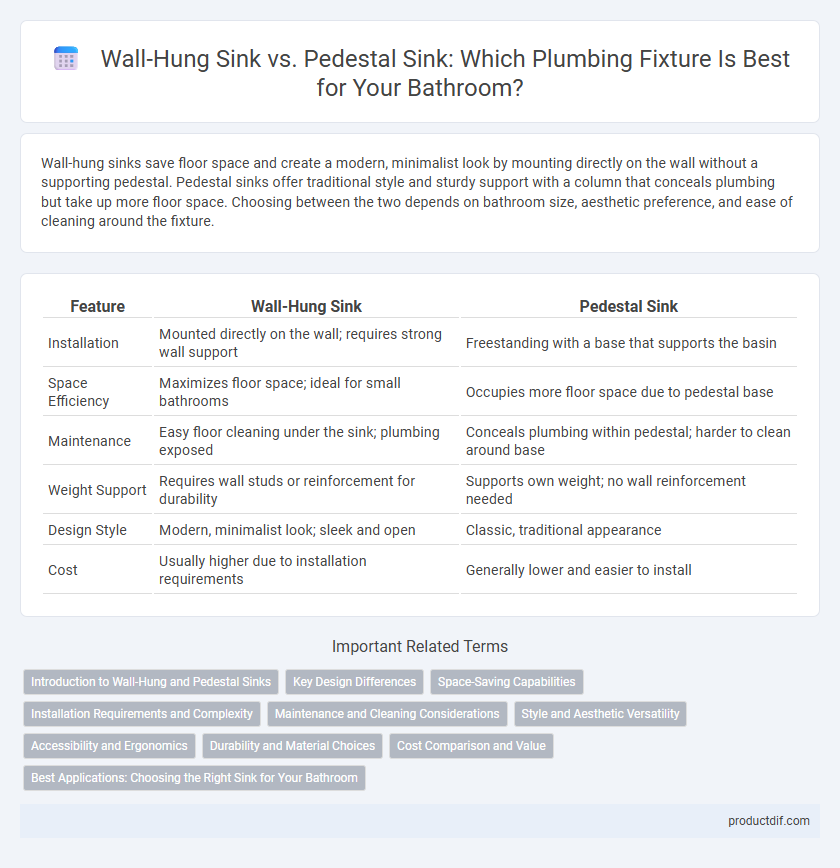Wall-hung sinks save floor space and create a modern, minimalist look by mounting directly on the wall without a supporting pedestal. Pedestal sinks offer traditional style and sturdy support with a column that conceals plumbing but take up more floor space. Choosing between the two depends on bathroom size, aesthetic preference, and ease of cleaning around the fixture.
Table of Comparison
| Feature | Wall-Hung Sink | Pedestal Sink |
|---|---|---|
| Installation | Mounted directly on the wall; requires strong wall support | Freestanding with a base that supports the basin |
| Space Efficiency | Maximizes floor space; ideal for small bathrooms | Occupies more floor space due to pedestal base |
| Maintenance | Easy floor cleaning under the sink; plumbing exposed | Conceals plumbing within pedestal; harder to clean around base |
| Weight Support | Requires wall studs or reinforcement for durability | Supports own weight; no wall reinforcement needed |
| Design Style | Modern, minimalist look; sleek and open | Classic, traditional appearance |
| Cost | Usually higher due to installation requirements | Generally lower and easier to install |
Introduction to Wall-Hung and Pedestal Sinks
Wall-hung sinks are mounted directly on the wall, saving floor space and offering a modern, minimalist look that enhances bathroom accessibility and ease of cleaning. Pedestal sinks consist of a basin supported by a freestanding pedestal, providing a classic and elegant design while concealing plumbing and offering moderate storage space. Both options vary in installation requirements, style, and functionality, catering to different bathroom layouts and user preferences.
Key Design Differences
Wall-hung sinks feature a sleek, space-saving design mounted directly on the wall, allowing for exposed plumbing and easier floor cleaning, while pedestal sinks offer a classic aesthetic with a freestanding column that conceals plumbing but occupies more floor space. Wall-hung sinks are ideal for modern, minimalist bathrooms with limited space, whereas pedestal sinks complement traditional or vintage-style bathrooms with their sturdy base and decorative appeal. The choice between these fixtures hinges on balancing visual style, space efficiency, and plumbing concealment preferences.
Space-Saving Capabilities
Wall-hung sinks maximize floor space by mounting directly on the wall, creating an open area beneath that enhances bathroom accessibility and storage options. Pedestal sinks, while compact, occupy more floor space due to their supporting column, limiting under-sink storage potential. For bathrooms with limited square footage, wall-hung sinks provide superior space-saving capabilities and a modern aesthetic.
Installation Requirements and Complexity
Wall-hung sinks require sturdy wall framing and precise mounting brackets to support their weight, making installation more complex and demanding professional expertise. Pedestal sinks offer simpler installation with fewer wall reinforcements needed, as the pedestal provides additional floor support, easing weight distribution. Both types necessitate accurate plumbing alignment, but wall-hung sinks demand more advanced skills to ensure secure attachment and proper drainage connections.
Maintenance and Cleaning Considerations
Wall-hung sinks offer easier access for thorough cleaning underneath and around the basin, reducing buildup of dirt and allowing simpler maintenance of plumbing connections. Pedestal sinks can complicate cleaning as their base restricts access to pipes and floor areas, often requiring more effort to prevent grime accumulation. Regular inspection for leaks is essential for both types, but wall-hung sinks facilitate quicker detection due to visible plumbing.
Style and Aesthetic Versatility
Wall-hung sinks offer a sleek, modern look with exposed plumbing eliminated, making them ideal for minimalist and contemporary bathroom designs. Pedestal sinks provide a classic, timeless aesthetic that complements vintage and traditional styles, with a sculptural base adding visual interest. Both fixtures enhance space perception differently, as wall-hung sinks create an open floor area while pedestal sinks serve as standalone focal points.
Accessibility and Ergonomics
Wall-hung sinks offer superior accessibility for wheelchair users and facilitate easier cleaning due to the open space beneath the basin. Pedestal sinks, while aesthetically traditional, limit legroom and can be cumbersome for individuals with mobility challenges. Ergonomically, wall-hung sinks provide adjustable installation heights, enhancing comfort and usability in diverse bathroom environments.
Durability and Material Choices
Wall-hung sinks often feature robust materials like stainless steel or vitreous china, offering enhanced durability and resistance to moisture damage compared to traditional pedestal sinks made primarily from porcelain. The wall-mounted design reduces floor contact, minimizing wear and potential cracking, while pedestal sinks, though stylish, are more susceptible to chipping and require careful maintenance. Material innovations in wall-hung sinks provide superior longevity, making them a preferred choice for high-traffic bathroom environments where durability is paramount.
Cost Comparison and Value
Wall-hung sinks generally cost more upfront due to complex installation and wall reinforcement requirements, but they save floor space and offer modern aesthetics, increasing property value. Pedestal sinks are more affordable and easier to install, making them budget-friendly while providing a classic look, though they offer less storage and may lower resale appeal. Choosing between the two depends on balancing initial expenditure against long-term functionality and home value enhancement.
Best Applications: Choosing the Right Sink for Your Bathroom
Wall-hung sinks are ideal for small bathrooms or modern designs where space-saving and easy floor cleaning are priorities, offering a sleek, minimalist look. Pedestal sinks work best in traditional or vintage-style bathrooms, providing a classic aesthetic while hiding plumbing without requiring extra cabinetry. Selecting between them depends on bathroom size, desired style, and functional needs such as storage or accessibility.
Wall-hung sink vs Pedestal sink Infographic

 productdif.com
productdif.com